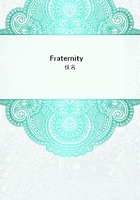
第80章
Since the morning when he had left her abruptly, Hilary had made a point of being out in the afternoons and not returning till past six o'clock. By this device he put off facing her and himself, for he could no longer refuse to see that he had himself to face. In the few minutes of utter silence when the girl sat beside him, magnetic, quivering with awakening force, he had found that the male in him was far from dead. It was no longer vague, sensuous feeling; it was warm, definite desire. The more she was in his thoughts, the less spiritual his feeling for this girl of the people had become.
In those days he seemed much changed to such as knew him well.
Instead of the delicate, detached, slightly humorous suavity which he had accustomed people to expect from him, the dry kindliness which seemed at once to check confidence and yet to say, 'If you choose to tell me anything, I should never think of passing judgment on you, whatever you have done'--instead of that rather abstracted, faintly quizzical air, his manner had become absorbed and gloomy. He seemed to jib away from his friends. His manner at the "Pen and Ink" was wholly unsatisfying to men who liked to talk. He was known to be writing a new book; they suspected him of having "got into a hat"--this Victorian expression, found by Mr. Balladyce in some chronicle of post-Thackerayan manners, and revived by him in his incomparable way, as who should say, 'What delicious expressions those good bourgeois had!' now flourished in second childhood.
In truth, Hilary's difficulty with his new book was merely the one of not being able to work at it at all. Even the housemaid who "did"his study noticed that day after day she was confronted by Chapter XXIV., in spite of her employer's staying in, as usual, every morning.
The change in his manner and face, which had grown strained and harassed, had been noticed by Bianca, though she would have died sooner than admit she had noticed anything about him. It was one of those periods in the lives of households like an hour of a late summer's day--brooding, electric, as yet quiescent, but charged with the currents of coming storms.
Twice only in those weeks while Hughs was in prison did Hilary see the girl. Once he met her when he was driving home; she blushed crimson and her eyes lighted up. And one morning, too, he passed her on the bench where they had sat together. She was staring straight before her, the corners of her mouth drooping discontentedly. She did not see him.
To a man like Hilary-for whom running after women had been about the last occupation in the world, who had, in fact, always fought shy of them and imagined that they would always fight shy of him--there was an unusual enticement and dismay in the feeling that a young girl really was pursuing him. It was at once too good, too unlikely, and too embarrassing to be true. His sudden feeling for her was the painful sensation of one who sees a ripe nectarine hanging within reach. He dreamed continually of stretching out his hand, and so he did not dare, or thought he did not dare, to pass that way. All this did not favour the tenor of a studious, introspective life; it also brought a sense of unreality which made him avoid his best friends.
This, partly, was why Stephen came to see him one Sunday, his other reason for the visit being the calculation that Hughs would be released on the following Wednesday.
'This girl,' he thought, 'is going to the house still, and Hilary will let things drift till he can't stop them, and there'll be a real mess.'
The fact of the man's having been in prison gave a sinister turn to an affair regarded hitherto as merely sordid by Stephen's orderly and careful mind.
Crossing the garden, he heard Mr. Stone's voice issuing through the open window.
'Can't the old crank stop even on Sundays?' he thought.
He found Hilary in his study, reading a book on the civilisation of the Maccabees, in preparation for a review. He gave Stephen but a dubious welcome.
Stephen broke ground gently.
"We haven't seen you for an age. I hear our old friend at it. Is he working double tides to finish his magnum opus? I thought he observed the day of rest.""He does as a rule," said Hilary.
"Well, he's got the girl there now dictating."Hilary winced. Stephen continued with greater circumspection "You couldn't get the old boy to finish by Wednesday, I suppose? He must be quite near the end by now."The notion of Mr. Stone's finishing his book by Wednesday procured a pale smile from Hilary.
"Could you get your Law Courts," he said, "to settle up the affairs of mankind for good and all by Wednesday?""By Jove! Is it as bad as that? I thought, at any rate, he must be meaning to finish some day.""When men are brothers," said Hilary, "he will finish."Stephen whistled.
"Look here, dear boy!" he said, "that ruffian comes out on Wednesday.
The whole thing will begin over again."